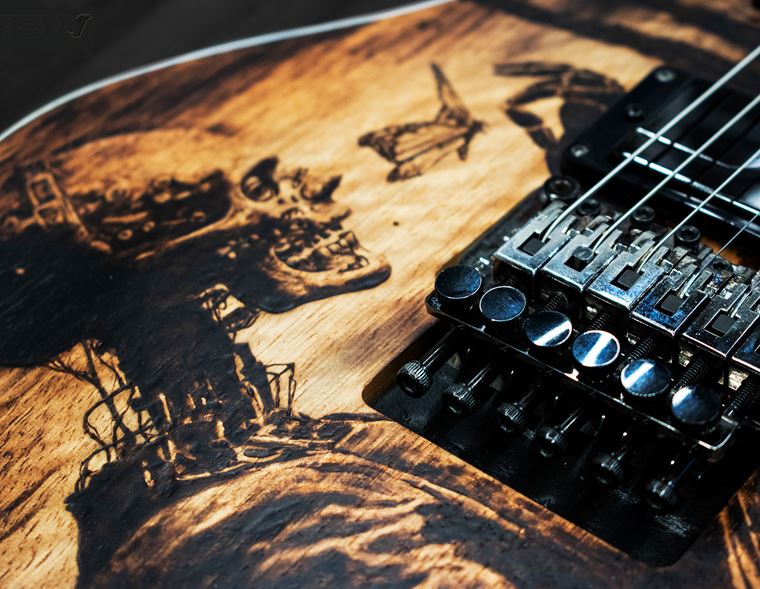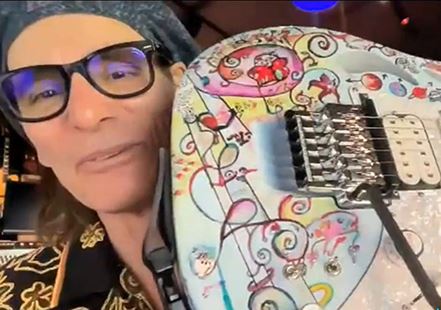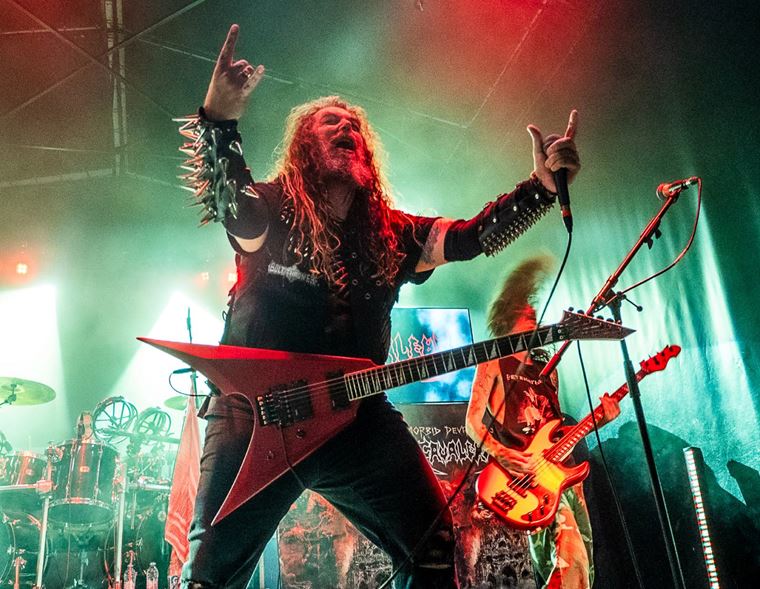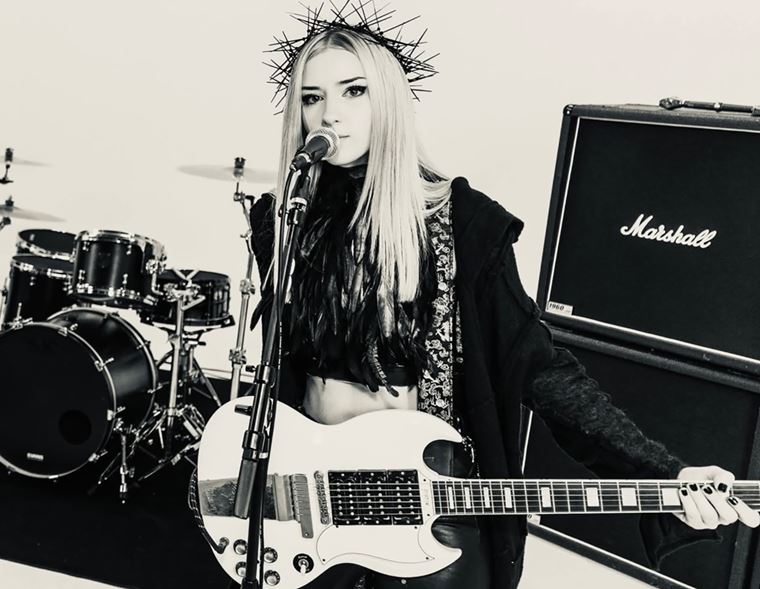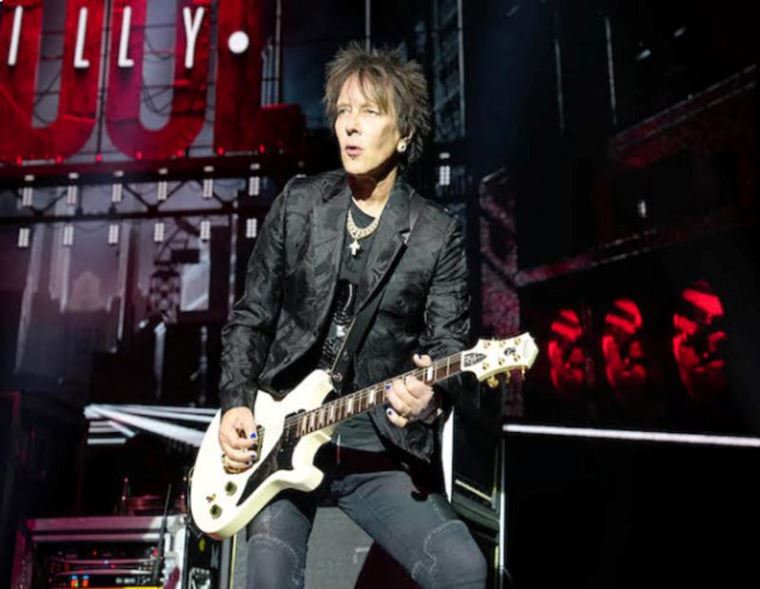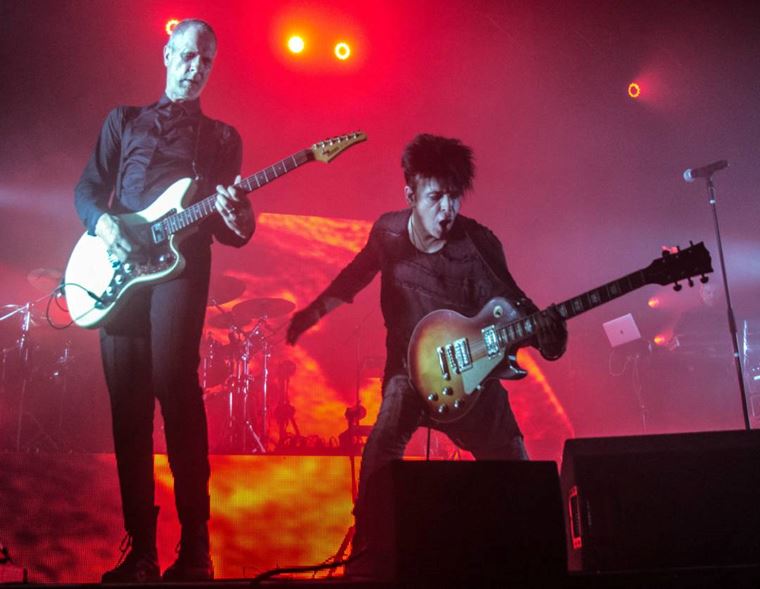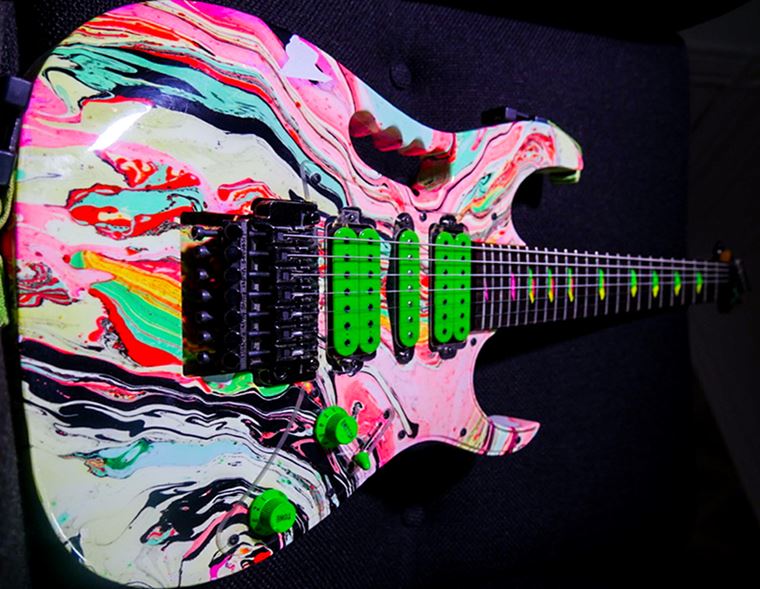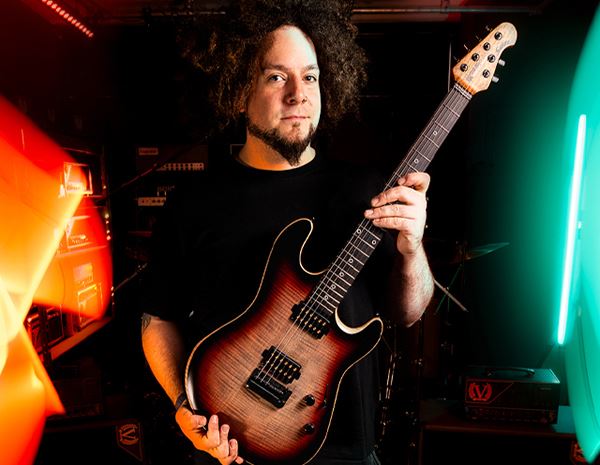Ministry: Al Jourgensen and Cear Soto EXCLUSIVE Interview!
Al Jourgensen will have none of it, but he and his band Ministry are pioneers in the field of Industrial Metal. More than any other artist, Ministry brought Metal riffs, samples, synths, drum machines and politically-themed lyrics together in a cyber-gumbo, the likes of which no one had ever before heard. Ministry were the band that your Metal friends loved, that your electronic and Techno pals were scared of but begrudingly respected, and that your parents absolutely hated.
It goes like this: no Ministry- no Rob Zombie, no Rammstein, no Nine Inch Nails. No hyperbole there, just truth. This is the band who used the notion of juxtaposition to allow Country-tinged harmonica to sit next to pulsing monosynths, for razor-sharp guitars to mix in next to carefully manipulated samples. It’s a thrilling sound, and one that’s been highly pillaged over the years.
Ministry mastermind Al Jourgensen has been a Schecter user for a long time, playing various custom axes that range from coffin-shaped to tridents! Fellow guitarists Sin Quirin and Cesar Soto are also part of the Schecter family, and through them, we were able to gain a much-appreciated meet up whilst Ministry were in town.
Al doesn’t tend to do interviews when on the road, so the first part of this (large) blog is a Q&A I conducted with him via email. His answers are reliably glib and humourous, much as you’d hope for from the man who names his albums ‘The Land of Rape and Honey’ and ‘The Mind is a Terrible Thing to Taste’. We’ll check that out now and then pick up the tale...
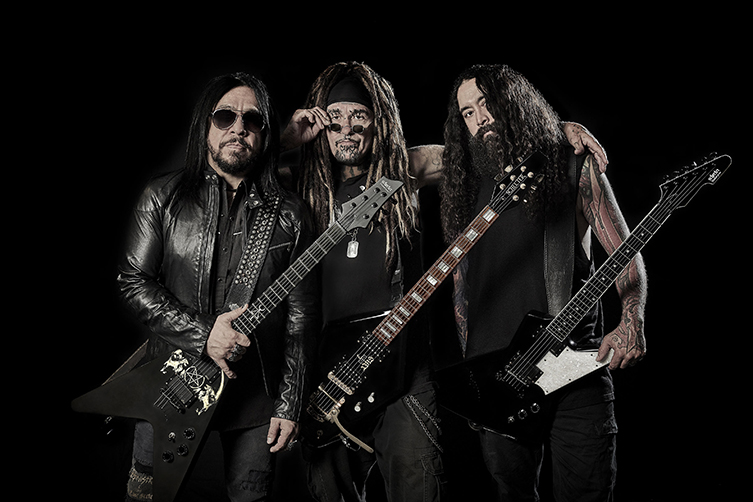
(pic by Derick Smith)
Al Jourgensen Interview
Guitarguitar: Al, thank you for agreeing to talk with us! I guess the first thing I wanted to ask is about sampling. You are rightly regarded as one of the pioneers of the form: what was your first ever sampler and what attracted you to the idea of sampling in the first place?
Al Jourgensen: Actually, my first ‘sampler’ was a Sony Nagra portable recorder. I would walk around sampling noises and edit them on tape later, or I would dump them on a disc and place them back on an Akai 3000. As far as why I sampled? I was fascinated with the cut up literary methods of William Burroughs and Brion Gysin and the way you could change the narrative of a story or in my case a song through manipulation thereby changing the entire atmosphere of a pretty rudimentary riff or storyline.
GG: Can you remember what your first ever successful sample was? And did it make it into a Ministry song?
Al: I brought the Nagra to my uncle’s dentist office and sampled the sounds of all his various drills and instruments. The most obvious example of that would be something like the song Thieves.
GG: You are well known as being one of the inventors of Industrial music, certainly Industrial Metal. Back in the 80s, did you set out with a particular vision to make this style of music, or was that sound a by-product of your sonic experiments with technology?
Al: I’m given way too much credit for “vision” or innovation. I just did shit that sounded good to me. There was no long-term plan or anything.
GG: You can play lots of instruments, not least the guitar, bass, drums, keys, pedal steel and so on. When writing, to you tend to have a particular instrument you go to, or is the studio more of your songwriting tool?
Al: Each song takes its own path. Most of the time as simple as whatever mood or drug I was on that particular day.
GG: Back when you made Twitch and so on, you must have had to use a huge amount of studio gear compared with when can be done today. These days, what are your main pieces of studio equipment for making Ministry records?
Al: Pro Tools, plug ins, and an SSL board usually does the trick.
GG: Do you still make a lot of samples?
Al: Yes, but in a different way. I like intertwining already-recorded loops and altering them to give them their own characteristic and signature as opposed to going out in the field, if you will, armed with a portable recorder. Most sounds are already available in one form or another, so my time is spent combining them for a different effect.
GG: I love the distorted guitar sounds you get: are you doing things old-school with amps and microphones? Or do plugins get used too?
Al: Each one is done differently and individually through various means. But the guitars and basses are one of the few things I don’t use plug ins on.
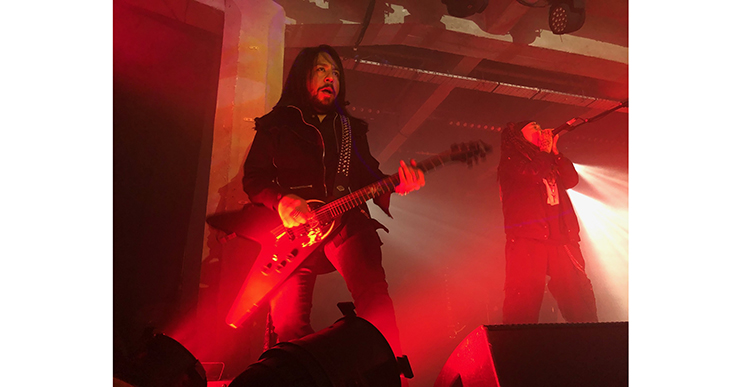
GG: You’ve been with Schecter for many years now as an endorsee. What is it about Schecter guitars you like?
Al: Well, for starters I get them free...lol...but they make them for me in the custom shop and those folks are top notch!
GG: Since riffs are a big thing for you, do you prefer heavier strings and picks on your guitars?
Al: I’ve always only used copper picks. I started learning guitar with coins as picks and never really used traditional plastic picks. At least now they’re shaped like picks and are custom made for me with various thicknesses. As far as strings, if I’m playing slide then I’ll use a heavier gauge, say, 13’s on top. If I’m playing traditional tunings, I’ll just use a 9 or a 10 on top. I do make the bottom 3 strings heavier though than a traditional set. Makes it a bit chunkier.
GG: What is the recipe for a great guitar riff?
Al: Psychedelics and alcohol for starters...lol... seriously there is no “recipe” or formula for a good riff. It’s whatever makes you feel good.
GG: What tuning are you currently using? It sounds pretty low...
Al: Drop D for most. And open E for slide.
GG: How does life on the road compare with life at home or in the studio?
Al: It’s nice to wake up in your own bed and since my studio is in my house, I don’t have to figure out time zones or what the fuck city I’m in.
GG: You were hand-picked by the legendary director Stanley Kubrick to appear in his movie A.I. (which Steven Spielberg then finished after Kubrick’s death). Did you develop much of a friendship with Kubrick?
The U.S. is symptomatic of the entire system that has consumed the entire world. Multinational corporations with absolutely no moral compass or concern for the survival of a functioning society or planetary survival find spineless politicians to perpetuate their obscene objectives at the expense of human survival. Overall, it’s pretty grim. Changing one government to another only perpetuates cosmetic changes which last a decade or 2 at best. It’s the underlying systems that have been put in place and perfected by a select few for millennia that needs to be destroyed. Sorry to be so cheerful.
Al: Unfortunately, I only spoke with him once by phone. Subsequently he died before filming began and I got dropped into Spielberg’s lap as he took over direction of the movie.
GG: In your decades on successful navigation of the music industry, what is your take on the current state of the business?
Al: To be frank I wasn’t aware that a Music industry still even existed. At least not in the way that we knew it to be. I’m kind of oblivious to it now. I just keep writing shit if I’m inspired to do so at the time and let other folks figure out whatever way to go forward for other people to hear it.
GG: How has streaming culture changed the business for you? Do you ultimately see streaming sites like Spotify a good thing or a bad thing?
Al: It would be great if they even made an attempt to equitably pay the artist. If you thought it was dire for artist to be compensated it’s even worse now.
There are, however, very clever artists that have carved their own path to financial benefit through various outlets and means. I’ve been fortunate enough (A) not to be needy or greedy, and (B) not to be consumed by $$$ as a motivating factor. Just make sure you buy our fucking merch... (just kidding)
GG: As an outsider, the situation in the US with the President, alt-right, racism, abortion and immigration make the place seem pretty crazy. You’ve addressed this on Ministry’s most recent, and awesomely uncompromising album, Amerikkkant. For those who haven’t heard it, what is your take on the current state of the US?
Al: The U.S. is symptomatic of the entire system that has consumed the entire world. Multinational corporations with absolutely no moral compass or concern for the survival of a functioning society or planetary survival find spineless politicians to perpetuate their obscene objectives at the expense of human survival. Overall, it’s pretty grim. Changing one government to another only perpetuates cosmetic changes which last a decade or 2 at best. It’s the underlying systems that have been put in place and perfected by a select few for millennia that needs to be destroyed. Sorry to be so cheerful.
GG: Aside from yourself and a few other bands, not many famous artists are stepping up and commenting on the way the world actually is right now. Why do you think that is?
Al: I think you should comment, write, or take action in what you are versed in and most comfortable in your skin with. I don’t begrudge folks that sing about relationships, cars, bling, sex, blah blah blah as much as I don’t begrudge anyone with any particular political view etc. Do what feels right for you.
GG: Finally, Al. You’ve made it to 60 years old and survived a number of life-threatening conditions and situations that would have finished off lesser men. What is your secret to staying strong, focussing and getting things done?
Al: Guess I’m just fucking lucky. Certainly not a blue print I would recommend anyone else!
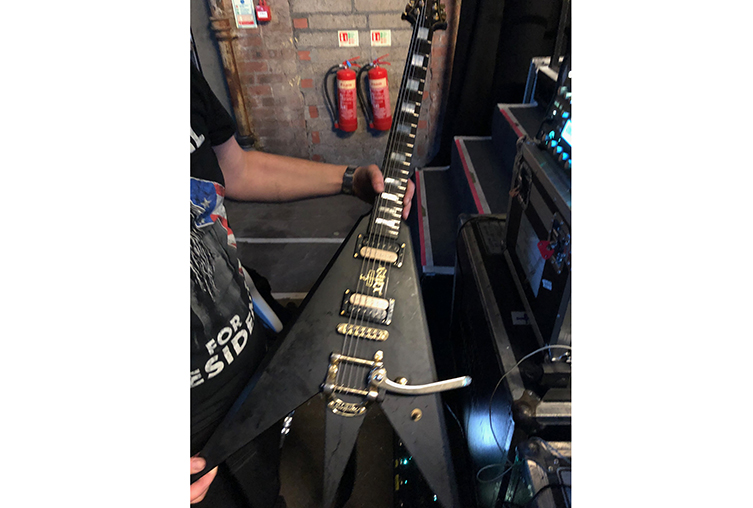
Legendary stuff! Just what I was hoping for.
On the day of the show, I made my way down towards the Clyde to the venue and was pointed towards a large silver tour bus. I knew to look out for Liz, Ministry’s manager, since she had red dreadlocks. Easy! I was told in advance that Al wouldn’t be there himself, which the ministry fan in me lamented but the professional in me fully accepted.
However, upon approaching the bus, Liz happened to be standing beside a more than familiar be-dreadlocked face. Let’s face it, you are not going to confuse Al Jourgensen with anybody else on the planet! It was an unexpected thrill to say hi, shake hands and exchange a few pleasantries before being whisked around the back to a secluded picnic table area.
As trains trundled by, I prepared for the guys to arrive. Cesar was first, tall, bearded and with a mane of curly dark hair, he was exactly how a guitarist for Ministry should look. Sin appeared a minute or two after, leather jacketed and wearing shades, again the true Rock star.
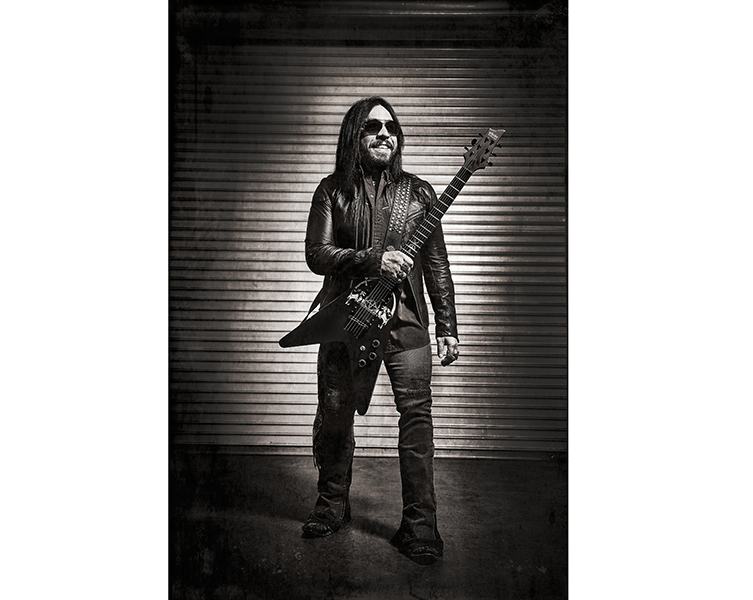
(pic by Derick Smith)
Both guys proved to be exceedingly good company, happy to hang, chat, laugh and swap stories about anything I cared to ask. It was a privilege, but it was also just loads of fun! Both men are highly entertaining, so I’ve decided to transcribe our entire 40 minute conversation, leaving nothing out except for repeated words and lots of the laughter.
If you ever wanted to know about playing guitar with Ministry, it’s likely to be found in the piece below!
Sin Quirin & Cesar Soto Interview
Guitarguitar: So, I guess we could begin with how you guys got involved with Ministry?
Sin Quirin: Well I came in 2006 with the Revolting Cocks (Ministry side-project), I had met Al in 2003/2004, and I was actually going to come in and play guitar on the 2004 tour. I was sort of on the side-lines and I learned the set, but they got these guys from El Paso, which is where Al was living at the time, so I was on standby that whole tour and things didn’t work out. I met him through a booking agent and one of my old bass players, Paul Raven...
GG: From Killing Joke?
S: Yeah, he was bass player in one of my older bands, Society 1, and so between those two guys, they told Al about me and so that’s kind of how I came onto Al’s radar. But, you know, I didn’t end up doing that 2004 tour but I got the call from Al saying he was putting the Revolting Cocks back together and did I want to play guitar on that, and then on the Ministry tour in 2006, so that’s when I came into the fold, in 2006.
GG: Nice, that’s a good story! What about you, Cesar?
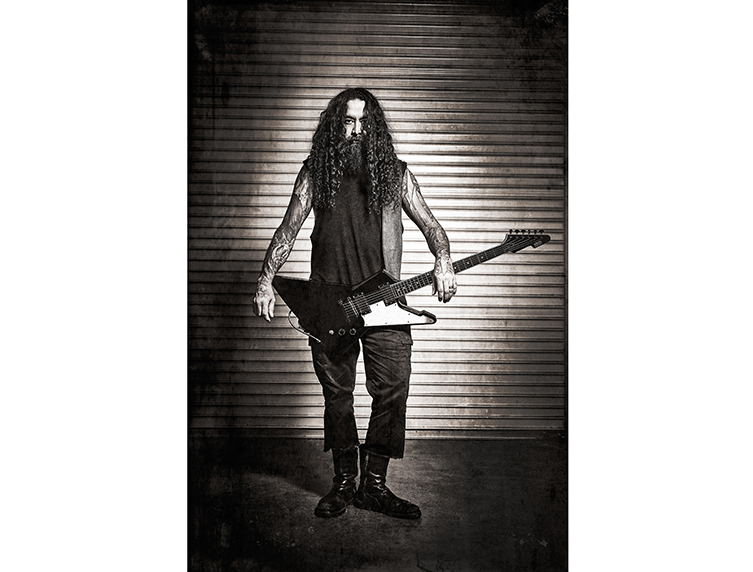
(Pic by Derick Smith)
Cesar Soto: I came in about 5 years ago. I’ve known Sin for about 20 years, from separate bands, we used to date (laughter), we used to tour together in our separate bands. We lost contact for a little bit and then I remember reaching out to him to say congratulations when he got the Ministry gig. I don’t think Facebook was even around, this was, like, Myspace, and so he would come into town when Al was living in El Paso and we just kind of reconnected again.
In late 2014, Sin reached out to me and said ‘hey, are you interested in auditioning?’ and at the time he was posting about a lot of different projects he was involved in so I didn’t know which one he was talking about! Sure enough, it was Ministry and I was like ‘Fuck yeah!’ I started learning songs that day. I was kinda hyped: I’d been out of doing big, big tours for a while, just doing regional tours with some bands that I had back home. I just started recording stuff on a Pro Tools rig and sending it to him.
The opportunity came and I flew out in like February 2015 to audition and start rehearsing and that was it! I’ve been with the band even since, since Superbowl Sunday, February 2015.
GG: Nice! And were both of you guys Ministry fans prior to being involved personally?
S: Oh yeah, huge, huge Ministry fan. I mean, I was into Ministry in High School! It was one of the bands I was very influenced by and I sort of, you know, wanted to be in that kind of band. I was in lots of thrash bands, and I remember being in one thrash band back in the day, like the late 80s, and uh, I’d been cranking my ‘In Case You Didn’t Feel Like Showing Up’ live (Ministry) cassette, showing it to the guys in rehearsals and they just...didn’t know what the hell I was talking about! I was like, ‘Man! Let’s do some electronics, blah blah’ and they were just going ‘What the fuck are you talking about?’ They did not get it at all. And that was actually what got me out of that band because, instead of doing guitar solos, I was bringing in my actual keyboard, doing keyboard shit and they didn’t get it. At all. (laughs)
C: I remember my oldest brother, he’s about ten years older than me, he’s always been a super, super influence. He used to take care of me as a kid, he introduced me to all sorts of music, mainly heavy stuff and metal stuff . My brother ended up joining the Navy and he was stationed in Japan and he came back to visit bringing this case full of all-new cassettes or whatever so, just as I used to go through his old records, he let me go through all his tapes. He said ‘Hey, you have to listen to this!’ and it was (Ministry album) The Land of Rape and Honey cassette. I remember popping it in and I was like ‘Fuck!’ Stigmata is the first song, right?
GG: Ehhhhh, I think so.
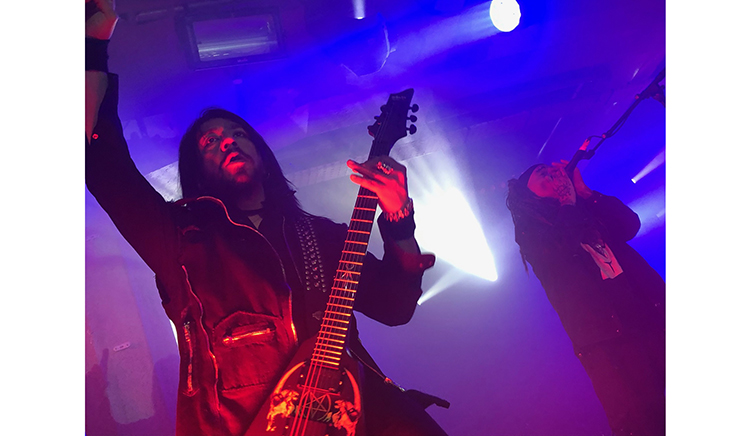
C: I remember specifically hearing that song and going ‘What the fuck is that? Is that, like, a chainsaw? Is that, like, a vocal? I didn’t know. I was just trying to grasp it and understand it because then I was listening to nothing but, like, Heavy Metal bands, you know what I mean? Rock and Heavy Metal bands and it was just like a bit thing for me. He discovered a new style of music and he passed it on, and that’s the very first, my very first introduction to Ministry.
GG: It’s good being a little brother!
C: Yeah! He ended up travelling to the other side of the world, discovering something different and bringing it back. Wow, you know what I mean?
GG: I do! I love it. Now, in terms of guitar playing, the more modern Ministry stuff has much more playing, more riffs and so on, that the Classic era stuff. Who do you guys approach how does what in a live context?
C: Mostly, I mean, I love playing rhythm guitar, man. For me, it’s a big foundation of like, the wall behind the stuff, you know what I mean? Both of us are pretty in sync with our rhythm playing, uh, but Sin takes most of the leads.
S: But we kinda split it though. Like, when I came in, I did ‘The Last Sucker’, and the songs that I wrote, I played lead on. And then on the tour in 2008, Tommy Victor was the other guitar player and he sort of took most of the leads, but again it was usually the songs he wrote, he’d play lead on. On the older stuff, it just kinda got split up. Every now and then, Al would be the one to say, you know, ‘Sin, you do this one, Mikey (previous guitarist), you do this’ and so on, so that did happen a few times back then. But now, especially with the old stuff, it’s mainly rhythm, there aren’t a lot of leads, but in the old stuff we do, we just kind of split it: he’ll do ‘Supernaut’, I’ll do ‘Hot Rod’ and Al does his thing on Hot Rod.
GG: So it all just kinds of finds its place quite naturally?
S: Yeah! Yeah.
C: I love leads, man, and I love playing leads but I’m really into rhythm playing man.
S: Yeah, same here. And Ministry is a very rhythm-oriented band as far as the guitar parts. I mean, if you listen to most of it, the newer songs do have solos but it’s 90% rhythm. The leads are there just, you know, for a little flavour.
GG: So with those rhythms, we’re talking gigantic riffs, like Ultra Metal. What kind of gear are you using to make that? I know you guys are both Schecter players and we’ll get to them in a wee minute but what about amps? Before I was recording our conversation, Cesar, you mentioned about that vintage Marshall JTM that your friend had. Are you guys using valve amps on stage? Have you tried digital stuff, like Kempers?
C: Uh, yeah, this is actually our first tour using Kempers.
R:Ahh, right! You’ve gone for Kempers!
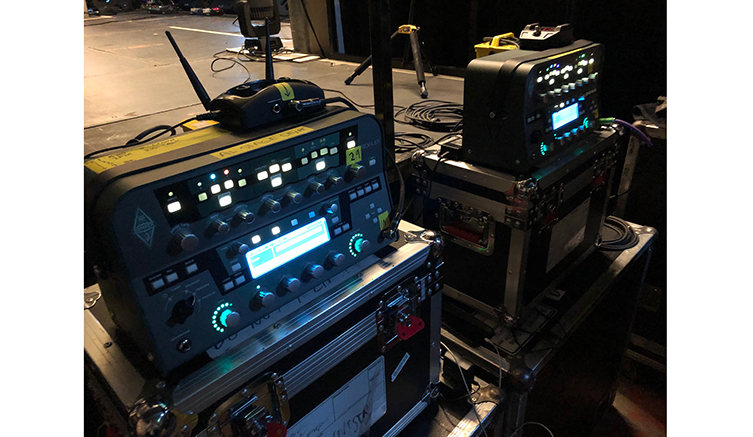
C; Yeah, very first tour using the powered Kempers, so we’re using the powered lunchboxes, but we’re using...I mean the profiles I’m using, it varies from Marshall Super Leads to like uh, I have some Wizards on there and, you know, Diezels, Mesas, it really depends on what the song calls for but yeah, I’m super, super happy with them.
GG: Yeah.
C: It’s just that, you don’t have to worry about it if something goes out, you don’t have to trace your steps, troubleshoot and find out what’s going on: I figured like, it’s gonna be one of four things that could’ve gone wrong and honestly, knock on wood, I haven’t experienced any problems whatsoever. They’re so killer man, it just makes everything so much more compact and...
S: Clean!
C: Yeah clean, and the little mini expression pedal to trigger our wahs and um...
R: You’d maybe need less overall stage volume? I’m assuming! Would that be true?
S: Yeah! Stage volume is definitely lower than we have been. Definitely in the last fucking two years! (laughs) Dude, out stage volume was like a full PA! It was so loud before. We used to use Al’s old JMPs, like the ones he used to use in the 80s and our stage volume was fucking outta control man, it was so loud. We went through his Marshalls on the 2008 and the 2012 tours and then in 2015 we started using Blackstar and we did, what, a couple of tours with Blackstar?
C: Mm-hmm!
S; And then we were with Mesa, and now we’re with these Kempers. But yeah...
C: Basically, it just makes sense.
S: Yeah.
C: It makes sense. We just had one of our friends yesterday tell us how kick-ass the guitar tone is sounding. Even coming through monitors, everything that’s coming on stage, it’s so much cleaner, it’s easier to hear everything else!
S: Yeah
C: Back then, we’d have to crank our amps and then have monitors coming through so it was like...
GG: A bit of a fight happening?
S: Yeah
C: Yeah, but I mean, we are using the powered Kempers with the cabs too.
GG: So you’re getting a bit of that on-stage kinda (makes a big woosh sound)
C: Yeah, it’s just so we get that onstage feel. For me it works because on some of the new Amerikkkant songs, there’s some feedback points and even on songs like ‘So What’, I feedback with harmonics and I need to make sure it’s right. You know what I mean? I need to make sure I’m getting the right volume from the cab, to make sure I’m able to feed back with that right harmonic, and that’s where the cab comes into play with the Kemper, yeah.
GG: That’s an interesting point with you guys, because you’ve got very heavy guitar sounds, so, often, you’d need a noise suppressor, so that the hiss isn’t the same volume as your notes...
Both guys: Yeah.
GG: So, does that mean you need to keep switching that on and off to get your feedback notes? Or does it just take care of itself?
S: Yeah! It’s so clean though, with these Kempers. I can sometimes, you know, swing my wedge monitor, and get the feedback that I need. Like, I can literally just get up there and control it just by walking close to that. I can do it with either the cabinet or the monitor. And we’re not having any fuckin’ noise issues at all, like they are fucking quiet as fuck man! Like, even in between, I can have my volume up on my guitar, and still, if I’m not playing, it’s dead quiet.
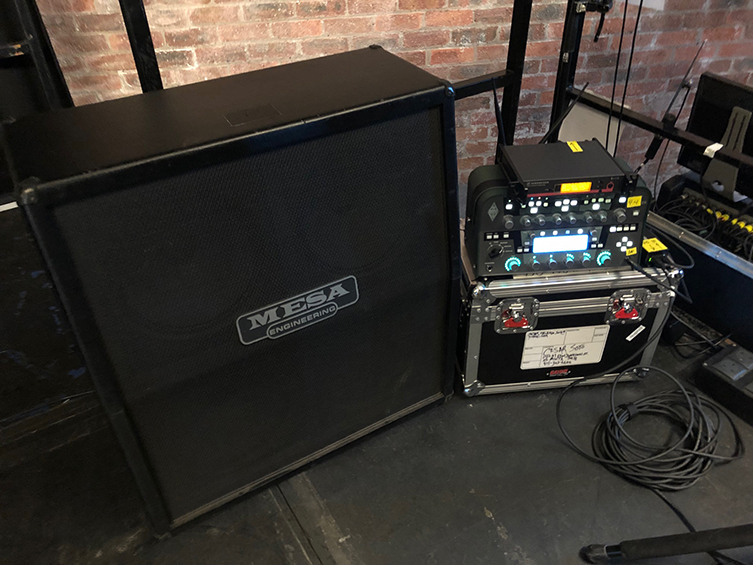
GG: Yeah
S: And in the past, it was all about having our noise gates and everything you know, so it’s been working really well for us.
GG: Pretty much everyone who I’ve been speaking to about digital guitar systems has been saying it’s all ‘plus, plus, plus, plus, plus’, and there’s no negatives really at all.
C: Yeah! There’re no negatives because all of the FX you need, like in-line effects and loop effects, it’s all there. I mean, everything you need. And it looks complicated but it’s super fuckin’ easy, man! And dude, that thing weighs like 5 or 6 pounds and its 600 watts! Something like that anyway.
GG: In other words: enough!
C: Yeah! And even 50 watts is enough! I’m a big fan of 50-watt heads, I love 50 watt heads.
GG: You can push them more, right?
C: Yeah, big time! Push it more and you get that nice saturation between your hand and your amp.
GG: There’s a bit of that alchemy going on with guitar playing, don’t you reckon? Where your interaction with your instrument, your volume, the tone you’ve created, the EQ... there is a sense, after you’ve been playing for a while, you know when things aren’t quite as you like them. And with valve amps, you can have the most beautiful ones in the world and night after night, you’re not necessarily gonna hear the same thing.
S: Right.
C: And you can run into problems too. You know, you’re sitting in your trailer, and you don’t have time for, like, valve amps, you know, you don’t have time for them to cool down usually, it’s a ‘get up and go situation’ you’re dealing with uh, windy festivals, or dirt and dust...I mean, I’m still a big fan of valve amps. I love valve amps! That’s my thing and I love them, I collect ‘em, but when it comes to touring, and touring like we do, including festival circuits and one-offs, Kempers just make sense! It makes sense to have this thing you can put in an overhead and it just sounds killer.
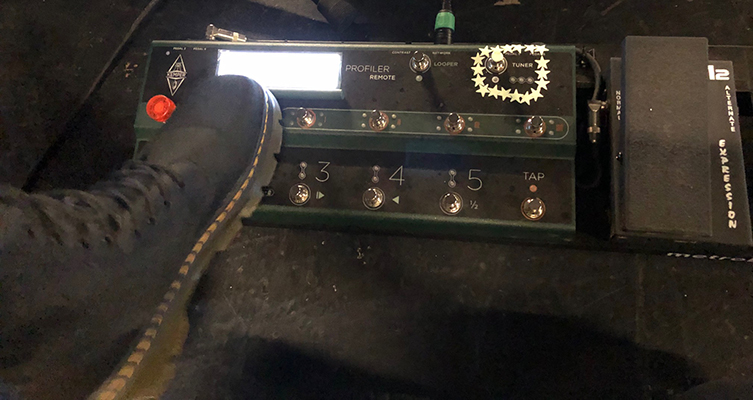
GG: And even ten years ago, with you guys being into valve amps, if you guys wanted to do what you’re doing now with the technology, you’d be able to tell the difference.
C: Yeah
GG: It’s kind of a testament to the quality of the Kemper that you guys are singing its praises, not because you have to but because it’s simply doing the job!
C: Yeah!
GG: Cuz otherwise you could stick with playing regular valve amps.
S: As far as me personally, I was kinda hesitant about using them cuz I was...I didn’t wanna like that! I kinda went kicking and screaming to it but everyone, all of our friends, all of our peers out here were just praising them so much. I mean, logistically they make sense and we’re not in controlled environments out here, you know. If you’re in a studio or using them at home, that’s different, but out here man, there’s just too many variables that change, and these things are just dead on solid every night.
C: They’re consistent. You know what you want, and especially what the front of house dude wants and what the monitor guy wants. They want consistency just as much as we want consistency. I profiled my own heads and uh...
GG: It just takes a couple of minutes, right?
C: It takes a couple of minutes yeah, and I did that just to try it, just to see if I could do it: I need to re-profile ‘em cuz I didn’t profile ‘em right! That was the first time I did it! Now I know exactly what you need to do. You need to be able to use the guitar that you are gonna use live, the pickups that you’re gonna use live.
GG: Oh, interesting!
C: Yeah, cuz I did mine with passive pickups and I’m an active pickup user. I didn’t have my touring guitars with me. But I’ll do that when I get back, that’s one of my projects: to re-profile every single one of my heads.
GG: Nice! And that is also a nice segue for us to talk about your touring guitars! So, Sin, you have a Schecter signature model.
S: Uh-huh!
GG: I had a look at that recently, it’s awesome. So, what particularly did you need to have on it, spec-wise?
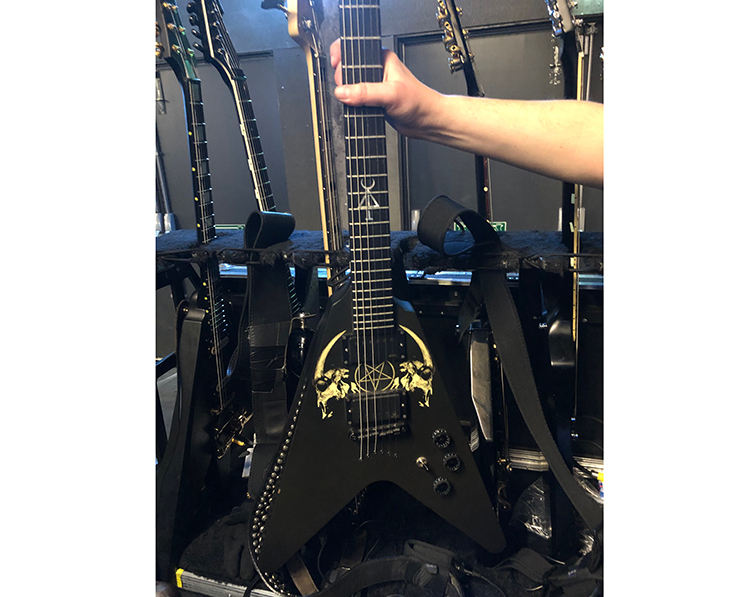
S: Well, what’s interesting with that is that I’ve been playing V’s, and Schecter V’s, since I came into the band. Tommy, Al, and Raven I believe, were all on Schecter already when I came in and they turned me onto them. When I first came onboard, they didn’t have V’s yet. And so, when I went over to Schecter and I met with them, just before that 2008 tour, I said to them I’d love to play Schecters and I’d love to be part of this company, but I really love a V!
For me, it’s easier to get higher up on the neck, and with the stuff I was playing with Ministry back then, there were a lot of solos up there, and Michael (Ciravolo, Schecter president) went ‘check this out’ and pulled out this schematic of a V! He’s like: ‘We’re about to come out with Vs!’ I was like ‘Holy shit dude!’ and was like ‘You’ll be one of the first guys to play our V’.
So this was like 2007. So, I played those until the 2012 tour and then in 2015 they asked if I was interested in having a signature and I said ‘Yeah, of course!’ We based it off of their standard V, cuz to me it was fucking perfect! I love how it played, feel was great, the neck was real smooth and easy for me to get up and down. At the time though, I was with Seymour Duncan. But then I went back to EMG and so the first run of my guitars had Seymour Duncans in them and then we quickly shifted (laughs) back to the EMGs.
That’s basically how it came out and the signature model that people buy is the guitar that I play: there’s nothing different.
GG: Wow, that’s really significant.
S: Yeah. Nothing against guys that had a different one that they play compared to the ones that they sell, but at least for me, I wanted it to be a signature model that is actually the one I’m playing. And I wanted to keep it affordable, I didn’t want it to be over a thousand bucks or something. I wanted kids to be able to be like, if they were fans, if they wanted one, we’d make it to where they could get one. So, we’ll see what happens after this, if I do another one, but that was basically it.
GG: Wicked!
S: Yeah!
GG: It’s a lovely guitar. I think, if you’re gonna be playing heavy riffs, they need some sort of ‘shape’ guitar.
Both guys: Yeah!
GG: And Cesar, you have an Explorer-type guitar?
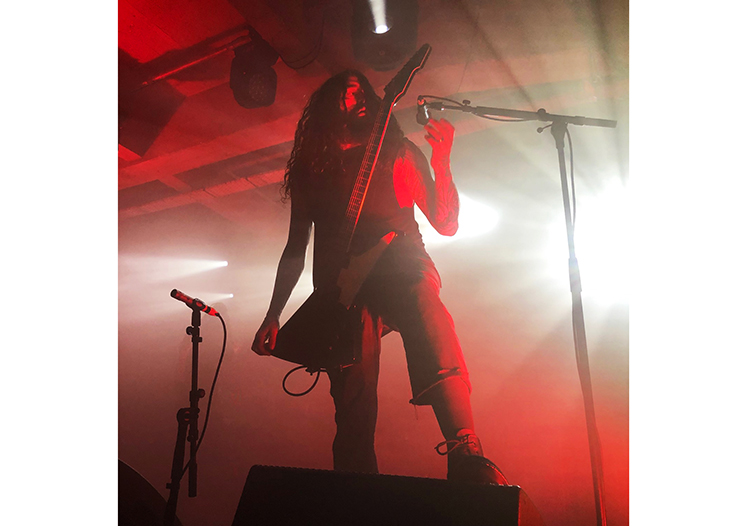
C: Yeah. I’ve always been a fan of the Explorer body shape but I’m playing what Schecter calls the E-1. I have two out with me, I have a few of them actually, but the two I chose for this tour is basically one that you can get, it’s like their least expensive E-1 that you can get just from their catalogue. It’s called the E-1 Standard, but I have a couple of upgrades: I put EMGs on there, they come with Schecter pickups but I use EMGs so we threw EMGs on there...
S: The Schecter pickups, by the way, are fucking great!
C: Yeah, their pickups are killer, I love their pickups.
GG: But for what you guys do, the active pickups give you...what? Is it more output? More compression? Is it that kind of idea?
C: Yeah, well, I use an 85 in the neck, that’s part of my personal tone, to use an 85 in the neck, no, I’m sorry, the bridge!
GG: The bridge?
C: Yeah, 85, bridge pickup.
GG: That’s backwards! Haha!
C: Yeah, weeell, the 85’s always been a bridge pickup!
GG: Really?
C: Yeah, it’s always been a bridge pickup. I think when the 81 came out, people started reversing them out.
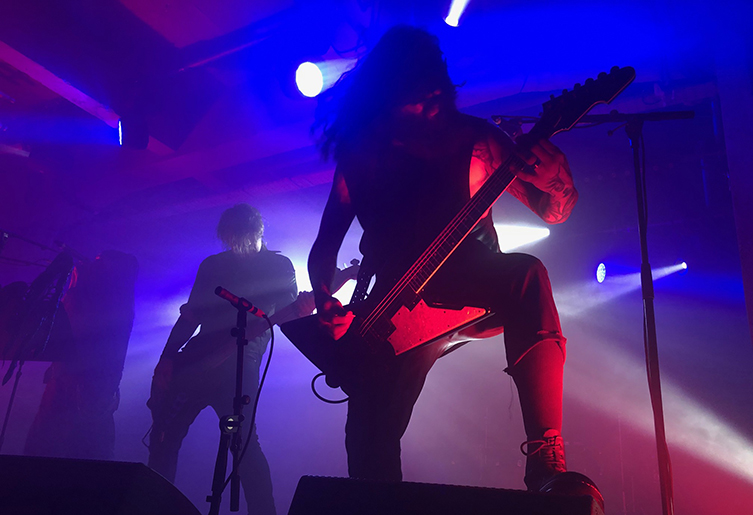
GG: Wow! I grew up with the Zakk Wylde-style, that was even what was in my first Flying V and I just thought that was the deal: an 81 in the bridge and 85 at the neck.
C: Aw yeah, 85 is killer in the bridge man, it’s real percussive, it’s a different pickup magnet, it’s an Alnico magnet.
GG: Rather than ceramic.
C: Ceramic, yeah. So, it’s a lot brighter and that doesn’t work for my hand. The 85 works with my right hand: it’s real big sounding, it’s like a wall of sound. Yeah, that’s the only way I could describe the 85; it’s real percussive and it’s a wall of sound. For a bridge pickup, that’s my go-to. And if you look at the EQ on it, you’ll see the mid on it, it has a really nice midrange.
GG: That’s where you have to kind of live as a guitarist: mids are all you’ve really got isn’t it?
Both: Yeah
GG: Everybody else is taking the top with the hi-hats and the bottom with the bass.
C: It’s a midrange instrument, yeah.
S: I use the EMG 85 and 81’s in some of my other guitars, but I have the EMG 57/66 set on my V’s simply because I’m trying to get the sort of older Ministry tone. I know that’s what Al likes and so I stick with those 57/66’s when I do Ministry tours. When I do other stuff, other projects or whatever, I’ll switch between those and my 85/81 as well. So I use both of those sets.
C: You know, what I love about the 57 is tha tit has the blend between passive and active.
S: Yeah
C: It has that nice, like it has that active growl, but it has that nice, really ‘HHHGGGHHH’
GG: Hahaha!
C: Really, like the top end of a passive pickup.
S: Which, if you listen to some of the older Ministry stuff, it’s closer to that kind of sound. So I mean, it’s a great blend we have, between his pickups and mine. It’s a really good blend we have on stage.
C: Yeah, when everyone has the exact same gear and the exact same frequencies, and front of house is mixing, uh, the exact same thing, it’s like ‘Uuuuhhh’.
GG: I know what you mean.

C: Yeah, instead of getting the best of two worlds, you’re fighting the same frequency but doubled up!
GG: Right: this guy’s problem over here is also this guy’s problem there.
Both: Yeah.
So, with guitars, is it mainly Standard tuning and Drop D for Ministry?
S: Mm-hm.
GG: So are you guys using tens on your guitars? 10 through 52?
S: I’m using a custom gauge from Ernie Ball, it’s a 9-52. There are a few Drop-C songs, that we don’t do on this run, but we have in the past: literally two or three songs that were in Drop-C. It’s predominantly...all the newer stuff is Drop-D and all the classics are in Standard.
GG: Got you. So, are you on 9s as well Cesar?
C: Uh, no, I’m 10-52, GHS, thin core Boomers. I like them because I’m just a very light player. If you look at my guitars, they’re set up so they’re almost bottoming out cuz I don’t like to fight with the instrument and I like to do a lot of exaggerated bends, so that’s perfect for me.
GG: David Gilmour moments!
C: Yeah!
GG: Which there won’t be too many opportunities for in a Ministry gig...
S: We get a couple, actually!
C: You never know! (laughs)
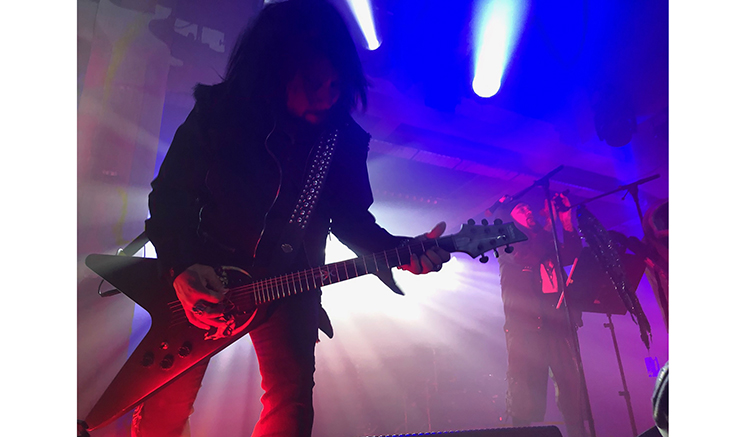
GG: So, what about plectrums? What do you guys prefer to pick with?
S: Uh, Dunlop Tortex 1.0mm.
C: I’m using Dunlop Tortex 1.0mm but the wedge.
GG: Ah, do you use the big ones?
C: I use the big bass pick, man!
GG: Right, this is interesting because I’m constantly...it was Devin Townsend that showed me this shape and said, this is the one.
C: It’s the big one!
GG: And ever since, I go back and forth between the normal size and the big Dorito one. Please tell me, why do you prefer the big one? It’ll help me out cause I kind of do as well!
C: Well, for one thing, check it out. (holds up pick) If I hold a pick, like, I can’t hold it like a normal players, I have this double joint in my thumb, it locks into place and so when the pick starts spinning around, I end up with another part of the wedge.
S: It starts moving?
C: Huh?
S: It starts moving?
C: Yeah, it starts moving! And instead of, like, fighting to bring the pick back in place if it spins, you know, it’s already nearly turned so I can play again.
GG: Every corner is a playing surface.
C: For me, I’ll tell you how I discovered it, man. I accidentally ended up getting some...I came across some Metallica wedge picks for their beer.
GG: Whaaaa?
C: Yeah, their beer. Metallica beer. And it was a Dunlop pick and it was a 1.0mm and I put one in my pocket. Just a promo for their beer. And I had a guitar in my hand and didn’t have any picks around, and I had that pick handy and I busted it out and tried it. I was like ‘this is the most comfortable fucking pick I’ve ever used!’
So, I called out Dunlop dude and said ‘hey, can you tell me the exact thickness that you made for this beer promo for Metallica?’ and they even sent me a picture of how they made the actual pick. I was like, ‘that’s it!’ and it was a 1.0mm and I said ‘I want those! I want that exact pick’ and it was like a rush order because they were so backed up so they ended up rushing it for me so I could get them for tour.
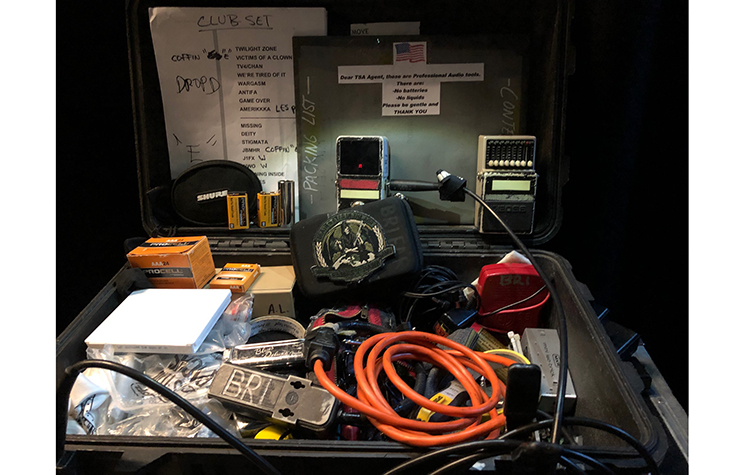
GG: Amazing! Dunlop are great people. So, guys, I’ve got loads already recorded here.
C: Keep goin’, man!
GG: Cool! Well, just let me know if you’ve had enough, haha! Sin, you don’t seem too well: (he has been sneezing and so on throughout the interview like he’s caught a bug) are you suffering?
S: Nah, I just look ugly.
(huge laughter all around)
S: I’ve been suffering for 50 years, man! Hahaha! Actually, other people have been suffering for 50 years!
GG: Shiiiiit. Aww, ‘Ray at guitarguitar Offends Ministry During Interview’ Great headline. Good work, haha! No, just because of your sneezing, you know what I meant! (more laughter)
So, I do have a couple of little things left here on my question sheet...oh, Sin, the graphic on your guitar has some quite cool ‘occult’ stuff. Is that just for a laugh or are you quite into that kinda thing?
S: No, I mean, I looked up....when I was getting ideas for what I wanted to put on the guitar, I mean, I’ve always dug the pentagram thing and then the skull thing just kinda popped into my head one day and I did, like, a rough sorta version of it and I thought: ‘Wow, I think that would look really cool!’ I didn’t put too much thought into it other than just: I wanted to be happy with what I put onto my guitar. So I put that together. And the symbol that’s on the neck as well, I was actually looking up symbols for the word ‘Sin’.
GG: That’s what I was wondering about!
S: Yeah! And that’s one of the symbols that popped up. And so, I sent that to Schecter and they were like ‘Yeah! That’s fuckin... whatever you want!’
GG: Haha!
S: So then I sent it to our visuals guy, our graphics guy, Ben, and he kinda cleaned it up for me and did the version that ended up on the inlays.
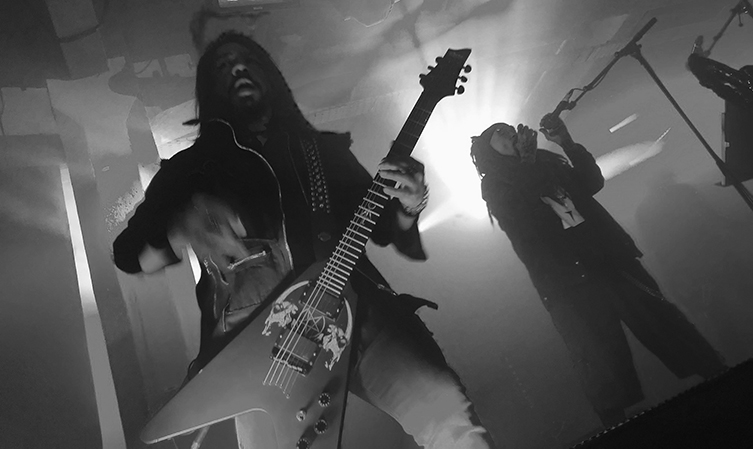
GG: Wicked. Cool! So, obviously you guys have toured a lot. As someone who has gigged a lot but never done a whole bunch of touring, I wondered: do you guys have an adjustment period when you come off tour to being back at home again? What’s that life divide like for you guys?
S: The first tours were difficult to come back from, it’s like I almost went into a slight depression. Out here, you get so used to the routine you’re doing, and you kinda get, I mean, without this sounding weird, you get used to like, everyone is like ‘you’re the greatest thing ever’, right? And like, high, like you’re on this constant high cuz like, every day you’re getting this positive energy and feedback from everyone, and you go home...and it all stops! Right? And I mean it’s weird! It’s something that I had to adjust to and realise ‘Okay, it’s just a struggle to adjust thing’ and now it is what it is, it’s what we do.
C: I think, me personally, I have a very, very well-balanced life. My two lives: the one on the road and my home life, are very, very different. I’m out here, doing what we love to do, and I also love to go home and do what I love to do. I’m a family man, I have kids, I’m married, so, you know, I’m able to enjoy what I do out here and I get all the support, the emotional support, the home support from my amazing wife and the kids, and when I get home it’s just a very different life.
Adjustment? Umm, I mean, for me, it’s always been, I think it’s been a smooth transition. I’m able to adjust. Through life, I’ve always been able to adjust to whatever the situation is: it is what it is.
GG: You take it in your stride.
C: and I can’t complain! Cuz we’re out here doing what we love to do and we’re very, very fortunate to be able to say: you know what? This is what we do for a living, we do what we love to do and y’ know, when I get home, I’m able to be that family man and that’s...I, I love my life, man! I couldn’t ask for my life to have gone any different. It was meant to be like this, and I don’t question it, and I just say ‘Fuck it’ man, I love it.
GG: Hell yeah.
C: Yup.
GG: Great answer! Right, okay so: the way the industry is, it’s so different to how it was even ten years ago. How does that affect a band like Ministry, who are a big band? When I did the email interview with Al, he was like ‘the is no music industry any more’. Spotify isn’t paying artists properly. And of course, twenty years ago, you bring out a new record and it’s like, if you have a hit, you can go out and buy a Ferrari, y’know? So how is it being a professional musician in 2019? Is it a struggle? Is it doable?
S: I mean, it’s definitely doable, though it is completely different than it was back in the day. Back then, you could pretty much solely survive off of this (touring) and now it’s hard. It’s difficult. I mean, it’s doable, but it’s definitely not what it was ten years ago, let alone 20 years ago. Now, you don’t really make any money off of your records any more. At least for us, it’s not something where we say ‘Okay, we’re gonna release a record so expect those cheques to be comin’ in, it just doesn’t happen (laughs). Luckily, we’re able to survive by touring, that’s the thing that keeps it going for us. But yeah, as far as records sales go, that doesn’t really happen anymore.
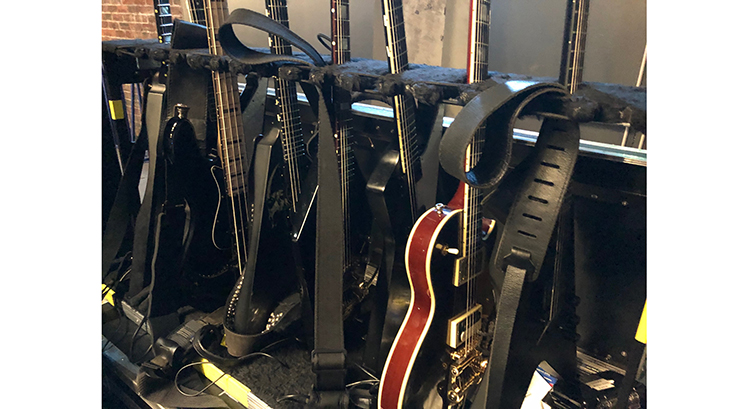
GG: So the advice is ‘get outstanding looking merch’?
S: Exactly! Yeah, merch, touring...
GG: Be an artist, basically...
S: That’s the stuff, man. That still brings in money.
GG: So the record is the advert for the experience of the band?
S: Right, exactly!
GG: Well, that’s nearly me, guys! I wrote one last question down on my sheet here, and I highlighted it too: what makes a great riff? That’s the most important question of all!
C: For me, I think what makes a great riff is simplicity, man. Simplicity and, um, turning it into an earworm. For whatever reason, yesterday, I’ve always had melodies stuck in my head and yesterday I had all these, like sixties R’n’B songs popping into my head man (laughs) and I love to sing, I just naturally love singing, just joking around but I think what makes a good riff or a great vocal line is simplicity and, and, just, like, making it stick. So, for me, the most simple guitar riffs or melodies are always the best ones.
S: Definitely. For me, keeping it simple and memorable...you know, nothing against technical players of stuff like that, it’s just not me. I’ll remember a fuckin’ AC/DC riff over someone who’s doing a fuckin’ million notes a second. For me, simple is way more effective. I mean: Back in Black, y’know? Those are the riffs you remember. Simple, catchy and sticks in your head.
GG: And punches you right in the gut.
S: Yeah!
C: And something that you love too, you know what I mean? It’s something you love and you feel.
GG: Yeah, you feel a good riff, right?
Both: Yeah!
Now that is a good note to end it on!
With that, Sin and Cesar brought me back inside, out of the unusually good Glasgow weather. We had a look at the stage setup, the Kempers, the Schecters, and a polite and friendly crew efficiently getting the stage ready for the evening’s set.
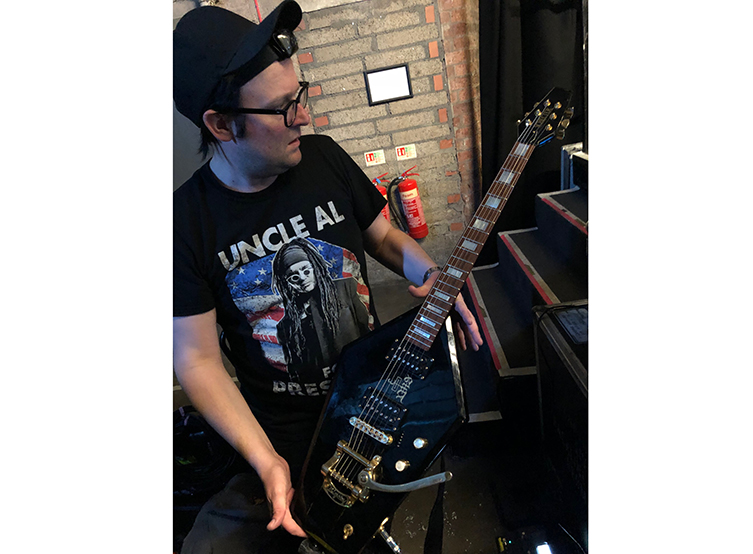
Cesar brought me across to his Kemper rig, stomped through a series of patches and blasted through the riff of what happened to be one of my favourite Ministry riffs, Just One Fix. It goes without saying that it sounded incredible. The whole crew were hospitable, letting me wander around for a while taking the odd pic.
That evening, Ministry absolutely destroyed. I’d seen them live before, and was impressed, but this time out it was relentless! The heaviness was bludgeoning but also razor sharp. Al was in fine form, full of energy, and my pals Cesar and Sin brought their A-game: machine gun riffing, powerful playing with tons of attitude and precision. It was a musical assault: despite wearing relatively good ear plugs, my lugs were ringing the next day! It was an appropriate end to a fascinating, enjoyable and special day. Not a bad day at the office, for sure.
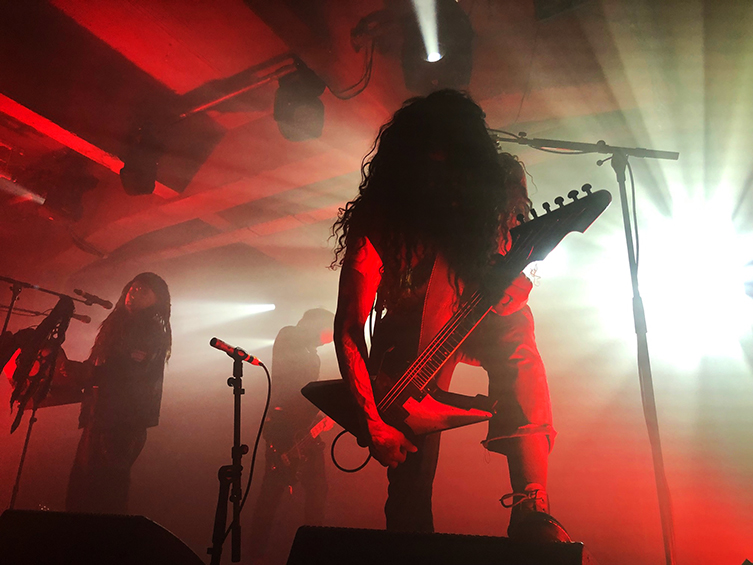
This has been something of an epic piece, so thanks for reading. I think a band like Ministry deserves no less! This kind of access to a top band doesn’t happen every day, so I’d like to offer my sincerest thanks to Liz Walton, Al Jourgensen, Sin Quirin, Cesar Soto and Andy Haldane for making this happen.
Ministry are on tour right now: keep up with them on the Ministry website. If they are playing near you, you don’t wanna miss them. Check out our current Schecter guitars and we’ll see you next time!
My thanks to the entire Ministry team for their incredible friendliness and hospitality. All photos are (C) Ray McClelland and usaed with permission.


